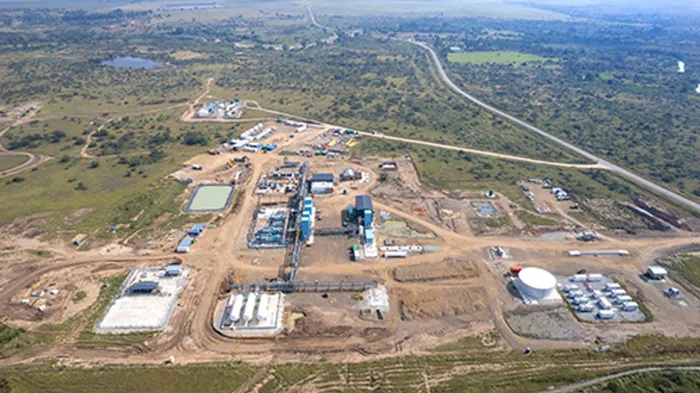Renergen announces interim loss and resolves dispute with Springbok Solar
GAS PRODUCTION

Renergen’s liquid natural gas and helium project near Virginia, Free State. The company has reached a jointly beneficial settlement agreement with Springbok Solar Power Plant, ending their legal dispute.
Image: Supplied
Renergen on Monday warned of a bigger interim loss and announced it has ended a legal dispute with Springbok Solar Power Plant (RF) as the parties have agreed to “mutually beneficial operations in the Free State.”
Renergen’s share price slipped 1.55% to R14.27 on the JSE in the morning, but the price remains substantially higher than only R3.63 in March this year, before the onshore helium and liquid natural gas producer reached an agreement to merge with Nasdaq and JSE-listed ASP Isotopes, which will ultimately lead to Renergen’s delisting from the JSE.
Following a period of protracted legal proceedings and regulatory review, Renergen and RF said jointly that they have agreed to settlement terms that ensure the protection of Renergen’s subsidiary, Tetra4’s rights to natural gas extraction, and the continued operation of the Springbok Solar Project, in accordance with South African law and the Mineral and Petroleum Resources Development Act (MPRDA).
The agreement follows a recent setting aside of the Section 53 approval relied upon by Springbok Solar for land use by the Director-General of the MPRDA, due to procedural defects.
In terms of the agreement, the parties have agreed that both Renergen’s Virginia Gas Project and the Springbok Solar Project will operate within the designated area, with clear protocols for ongoing communication and operational coordination.
Tetra4 will retain the exclusive rights conferred to it within the Production Right outside of the agreed boundary of the Springbok Solar Project facility, to explore and produce in the area.
The parties also agreed to engage in future discussions regarding legislation and regulation on the development and expansion of both companies in the Free State.
“Springbok Solar has indicated it regrets the circumstances that gave rise to the dispute and acknowledges the concerns raised by Tetra4 regarding their existing rights and, more specifically, the requirement to consult under Section 53 of the MPRDA,” a statement from the parties said on Monday.
“The agreement demonstrates that renewable energy and natural gas projects can coexist in harmony, provided that all regulatory processes are followed and stakeholders engage in good faith. Both Renergen and Springbok Solar affirm their commitment to supporting South Africa’s transition to a sustainable energy future,” the companies said.
Stefano Marani, CEO of Renergen, said the agreement closes a difficult chapter for both parties.
“We look forward to working alongside Springbok Solar and any other parties wishing to co-exist on our production right to deliver energy security and economic growth for South Africa,” he said.
On behalf of Springbok Solar, Katherine Persson said: “We are pleased to have concluded constructive engagement and to have agreed on a resolution. With growing overlap between renewable energy and mineral and petroleum rights, we believe ongoing consultation between stakeholders (including rights holders, other developments, and the regulatory authorities) is critical, including inter-departmental coordination, in supporting strategic infrastructure developments.”
The companies said they would continue to engage with the DMPR to ensure compliance with laws and to report on the progress of their projects.
Meanwhile, Renergen also warned that it expects its loss per share for the six months to end-August to widen by at least 20%, or to increase by 0.0915 per share, compared with the loss per share of 0.4573 for the same period a year before.
The increased loss was attributed to once-off transaction costs as a result of the merger with ASP Isotopes, an increase in depreciation for the fully commissioned Phase 1 plant, and costs that were capitalised in the previous period that were expenses in the current period, as well as increased interest expense.
BUSINESS REPORT